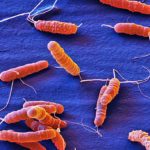Link to Pubmed [PMID] – 22529974
PLoS ONE 2012;7(4):e35072
H. pylori drug-resistant strains and non-compliance to therapy are the major causes of H. pylori eradication failure. For some bacterial species it has been demonstrated that fatty acids have a growth inhibitory effect. Our main aim was to assess the ability of docosahexaenoic acid (DHA) to inhibit H. pylori growth both in vitro and in a mouse model. The effectiveness of standard therapy (ST) in combination with DHA on H. pylori eradication and recurrence prevention success was also investigated. The effects of DHA on H. pylori growth were analyzed in an in vitro dose-response study and n in vivo model. We analized the ability of H. pylori to colonize mice gastric mucosa following DHA, ST or a combination of both treatments. Our data demonstrate that DHA decreases H. pylori growth in vitro in a dose-dependent manner. Furthermore, DHA inhibits H. pylori gastric colonization in vivo as well as decreases mouse gastric mucosa inflammation. Addition of DHA to ST was also associated with lower H. pylori infection recurrence in the mouse model. In conclusion, DHA is an inhibitor of H. pylori growth and its ability to colonize mouse stomach. DHA treatment is also associated with a lower recurrence of H. pylori infection in combination with ST. These observations pave the way to consider DHA as an adjunct agent in H. pylori eradication treatment.

